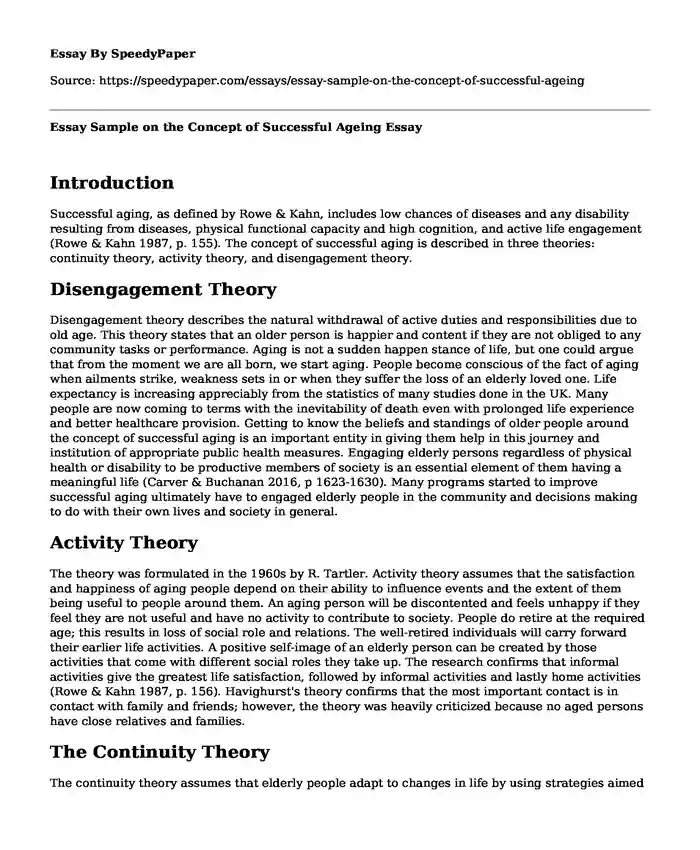
| Type of paper: | Essay |
| Categories: | Community health |
| Pages: | 3 |
| Wordcount: | 592 words |
Introduction
Successful aging, as defined by Rowe & Kahn, includes low chances of diseases and any disability resulting from diseases, physical functional capacity and high cognition, and active life engagement (Rowe & Kahn 1987, p. 155). The concept of successful aging is described in three theories: continuity theory, activity theory, and disengagement theory.
Disengagement Theory
Disengagement theory describes the natural withdrawal of active duties and responsibilities due to old age. This theory states that an older person is happier and content if they are not obliged to any community tasks or performance. Aging is not a sudden happen stance of life, but one could argue that from the moment we are all born, we start aging. People become conscious of the fact of aging when ailments strike, weakness sets in or when they suffer the loss of an elderly loved one. Life expectancy is increasing appreciably from the statistics of many studies done in the UK. Many people are now coming to terms with the inevitability of death even with prolonged life experience and better healthcare provision. Getting to know the beliefs and standings of older people around the concept of successful aging is an important entity in giving them help in this journey and institution of appropriate public health measures. Engaging elderly persons regardless of physical health or disability to be productive members of society is an essential element of them having a meaningful life (Carver & Buchanan 2016, p 1623-1630). Many programs started to improve successful aging ultimately have to engaged elderly people in the community and decisions making to do with their own lives and society in general.
Activity Theory
The theory was formulated in the 1960s by R. Tartler. Activity theory assumes that the satisfaction and happiness of aging people depend on their ability to influence events and the extent of them being useful to people around them. An aging person will be discontented and feels unhappy if they feel they are not useful and have no activity to contribute to society. People do retire at the required age; this results in loss of social role and relations. The well-retired individuals will carry forward their earlier life activities. A positive self-image of an elderly person can be created by those activities that come with different social roles they take up. The research confirms that informal activities give the greatest life satisfaction, followed by informal activities and lastly home activities (Rowe & Kahn 1987, p. 156). Havighurst's theory confirms that the most important contact is in contact with family and friends; however, the theory was heavily criticized because no aged persons have close relatives and families.
The Continuity Theory
The continuity theory assumes that elderly people adapt to changes in life by using strategies aimed at ensuring both external and internal continuity in their lives. Internal continuity enables them to link their new life experience with their past moments while external continuity allows them to have interactions with familiar people and places. The theory states that the behavior, personality, and preference of an individual will be the same in old age.
Conclusion
Successful aging is measured against the criteria of absence of diseases and disability, having mental and physical functioning, and active life engagement. Understanding of the concept of successful aging is discussed in three theories, which are: disengagement theory, activity theory, and continuity theory.
References
Carver, L. F., & Buchanan, D. (2016). Successful aging: considering non-biomedical constructs. Clinical interventions in aging, 11, 1623-1630. doi:10.2147/CIA.S117202
Rowe, J., and Kahn, R. (1987). Human aging: usual and successful. Science, 237(4811), pp.143-149. Doi: http://dx.doi.org/10.1126/science.3299702.
Cite this page
Essay Sample on the Concept of Successful Ageing. (2023, Jan 28). Retrieved from https://speedypaper.com/essays/essay-sample-on-the-concept-of-successful-ageing
Request Removal
If you are the original author of this essay and no longer wish to have it published on the SpeedyPaper website, please click below to request its removal:
- Essay Example on Medical Research Methodology
- Research Paper Sample on Using Songs for Teaching English
- Statutory Interpretation - Law Essay Example
- Advertisement Messages of Nivea. Essay Example.
- Essay Sample Dedicated to Families and the Work They Do and How Social Issues Impact Them
- Essay Sample on Pharmaceutical Pricing
- Free Essay Example - Flynn Effect
Popular categories




